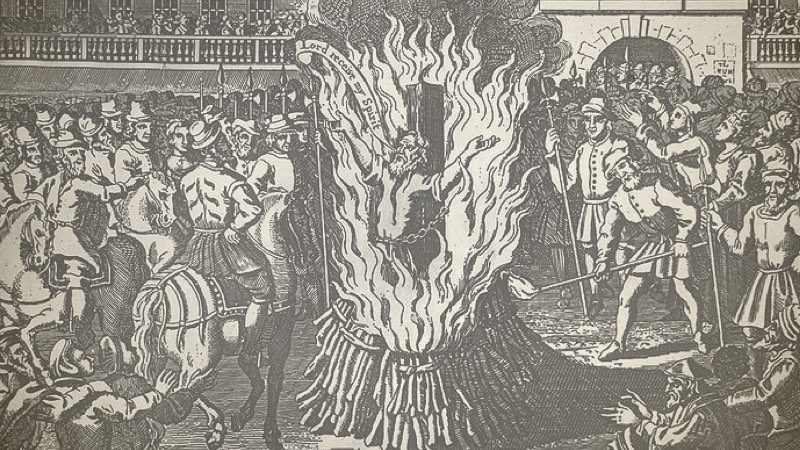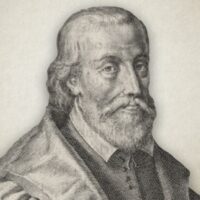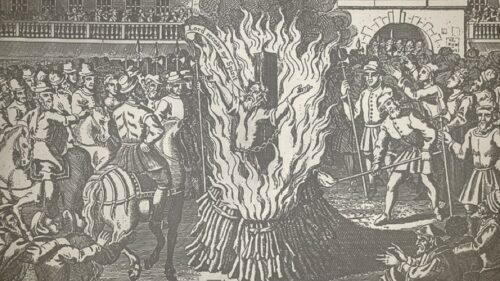
The Life And Martyrdom Of John Rogers
The Sower 1880:
The reign of Queen Mary will ever be associated with burning stakes and persecuting edicts. In all parts of the land—north, south, east, and west—men and women were haled to prison for the truth’s sake. Many were the modes of suffering which they endured, for all that human ingenuity could devise was made use of in prolonging and aggravating the tortures of these martyrs. Looking at these events exclusively from this standpoint, and only taking into consideration the brutal nature of the deeds and the trials of the victims, causes one almost to drop the pen, and cease from rehearsing facts at which the heart sickens. Our indignation rises to a very high pitch when we read how men could torture their fellow-creatures in such base and degrading ways; but we stop, and allow the curtain to drop on the dark side of the picture. Whilst we hesitate not to denounce the system that sanctioned such deeds, we also correspondingly admire and applaud the courage and fidelity, the constancy and heroism, of the martyr. This is the bright side of the picture. It is the martyr’s action that prompts us to recall these sweet and hallowed memories of the past, too often forgotten by us; and, by these short papers, we desire to instill into the minds of a few a keener appreciation of the invaluable privileges we enjoy. Today, after the lapse of three hundred years, we are reaping the fruits of the labours of the Marian martyrs, for it was in the fires of Smithfield and Oxford that our liberties were forged. Our rights and liberties—the right and liberty to read God’s Word in our native tongue, liberty of worship, liberty of conscience, and all that constitutes our freedom, religious, political, and social—all these ineffable blessings were purchased at a fearful cost—at no less a cost than our forefathers’ blood. “What enabled them to endure all these sufferings?”, is an inquiry that may suggest itself to some reflective mind. Our answer is, their faith. In the midst of the glaring flame and crackling wood we see that heroism which is of the noblest kind—the heroism of faith. At each stake stands an hero, whose faith enables him to “overcome the world” and all its snares and temptations, and to loudly shout “Victory!” in the hour of death, because of the eternal glory and honour that awaits him. This is true, genuine faith—that faith which is the gift of God—the faith of God’s elect. The Apostle Paul, in writing to the Hebrew saints, says that it was by faith that their ancestors “subdued kingdoms, wrought righteousness, obtained promises, stopped the mouths of lions, quenched the violence of fire, escaped the edge of the sword, out of weakness were made strong, waxed valiant in fight, turned to flight the armies of the aliens.” “They were stoned,” continues the Apostle, “they were sawn asunder, were tempted, were slain with the sword: they wandered about in sheepskins and goatskins; being destitute, afflicted, tormented (of whom the world was not worthy); they wandered in deserts, and in mountains, and in dens and caves of the earth.” This long catalogue of suffering did the Old Testament saints endure, and it was their faith—not a natural faith, but that which is of the operation of the Holy Spirit—that kept them steadfast and patient through all their various trials. So, too, was it their faith—the same divine faith—that caused our martyred ancestors cheerfully to walk to the stake and sing amid the flames, rejoicing because they were counted worthy to suffer for Christ’s sake. In short, the reign of Queen Mary is the “martyr epoch” of English history, and, on that account, it is one of the most sublime chapters in our national records. It is a reign dark with the cruel deeds of persecution, but bright with heroic actions of Christian courage: it is an era black with dismal and tragic events, but, nevertheless, it is brilliantly illumined with the joy and constancy of the martyr. The trials and sufferings, the torturings and deaths, of each and all of these valiant soldiers of the cross are beautiful confirmations of the following statement of the Apostle Paul: “For I am persuaded that neither death, nor life, nor angels, nor principalities, nor powers, nor things present, nor things to come, nor height, nor depth, nor any other creature, shall be able to separate us from the love of God, which is in Christ Jesus our Lord” (Rom. 8:38,39).
The first of the Marian martyrs was John Rogers, who received his education at Cambridge University, and was ultimately chosen chaplain to the English factory at Antwerp. Here he became acquainted with several of his own countrymen, who had, like himself, fled from their native land because of the determination of Henry VIII to conform the people to his own religious opinion. It was during his residence on the Continent that Rogers, having severed himself from the errors and superstitions of Rome, married. After this event, he proceeded with his wife to Wittenberg, and very soon he took charge of a living in Saxony, where he faithfully and diligently proclaimed the truths of the Gospel. Here he continued till the death of King Henry, when an event happened which caused Rogers and many of his fellow Englishmen to return to the land of their birth.
Edward VI came to the throne on the decease of his father, and nobly allied himself with those who were striving to promote the progress and establishment of true religion and Gospel liberty in this land. Soon after the accession of the young monarch, Rogers, at the request of many of his friends in England, returned to his native shores, and unceasingly laboured in the cause of his Master. Dr. Ridley was then Bishop of London, and he gave Rogers a prebend in the cathedral church of St. Paul’s, and he was afterwards one of the divinity lecturers in that church. King Edward’s reign, however, was but brief, and, at his death, events took a decided turn.
Queen Mary now came to the throne, and, although she declared in Council “that, though she was fixed in her own religion, yet she would not compel others to its observance, but would leave that to the motions of God’s Spirit and the labours of good preachers”—although she made this promise, yet quickly was it forgotten and ignored, as subsequent events too plainly proved. All Gospel preaching was speedily suppressed; the Privy Council and the episcopal bench were filled with Papists; a special day was set apart for the reconciliation of England to the Papal see, when the king and queen, the lords and commons, and the bishops and clergy, on bended knee, besought forgiveness at the hands of the Papal legate; and sanguinary edicts were promulgated against all who dared to preach “Christ and Him crucified.” John Rogers was one of those who dared to stand up in defence of Gospel truth, for he continued to preach after the edict was published, forbidding any man to do so unless specially licensed. For his contumacious conduct, Rogers was ordered to keep close prisoner in his own house. This, however, was a far too lenient way of dealing with “heretics,” and so Bonner, who was Bishop of London, removed him to Newgate, where he had criminals and thieves for companions. Three times was Rogers brought before Lord Chancellor Gardiner and the Privy Council, and three times did this noble martyr bear faithful witness for the truth before his implacable enemies.
At the first examination, which took place on the 22nd of January, 1555, the Lord Chancellor commenced the proceedings by saying to Rogers, “Sir, you have heard the state of the realm in which it standeth now?”
ROGERS: “No, my lord, I have been kept in close prison; and, except there hath been some general things said at the table, when I was at dinner or supper, I heard nothing; and there I have heard nothing whereupon any special thing might be grounded.”
The Lord Chancellor then jeeringly exclaimed, “General things! general things! Ye have heard of my lord cardinal’s coming, and that the parliament hath received his blessing, not one resisting it, but one man which did speak against it. Such an unity, and such a miracle, hath not been seen; and all they, in which there are eight score in one house, have with one acsent received pardon of their offences for the schism we have had in England, in refusing the Holy Father of Rome to be head of the Catholic Church. How say you? Are you content to unite yourself to the faith of the Catholic Church with us, in the state in which it is now in England? Will you do that?”
ROGERS: “The Catholic Church I never did nor will dissent from.”
GARDINER: “Nay; but I speak of the state of the Catholic Church in that wise in which we stand now in England, having received the Pope to be supreme head.”
ROGERS: “I know no other head but Christ of His Catholic Church, neither will I acknowledge the Bishop of Rome to have any more authority than any other bishop hath by the Word of God, and by the doctrines of the old and pure Catholic Church, four hundred years’ after Christ.”
GARDINER: “Why didst thou, then, acknowledge King Henry VIII to be supreme head of the Church, if Christ be the only Head?”
To this interrogation, Rogers replied: “I never granted him to have any supremacy in spiritual things, as are the forgiveness of sins, giving of the Holy Ghost, authority to be a judge over the Word of God.”
GARDINER then said: “Yea, if thou had saidst so in his days, thou hadst not been alive now. What sayest thou? Make us a direct answer whether thou wilt be one of this Catholic Church—or not—with us in that state in which we are now?”
ROGERS: “My lord, without fail I cannot believe that ye yourselves think in your hearts that he is supreme head in forgiving of sins, seeing you and all the bishops of the realm have now twenty years long preached—and some of you also written—to the contrary, and the parliament so long ago condescended unto it.”
GARDINER: “Tush! that parliament was, with great cruelty, constrained to abolish and put away the supremacy from the Bishop of Rome.”
ROGERS: “With cruelty? Why, then, I perceive that you take a wrong way, with cruelty, to persuade men’s consciences; for it should appear by your doings now, that the cruelty then used hath not persuaded your consciences. How would you, then, have our consciences persuaded with cruelty?”
GARDINER: “I talk to thee of no cruelty, but that they were so often and so cruelly called upon in that parliament to let the act go forward—yea, and even with force driven thereunto; whereas in this parliament it was so uniformly received.”
ROGERS: “I will first see it proved by the Scripture. Let me have pen, ink, and books, &c., and I shall take upon me more plainly to set out the matter, so that the contrary shall be proved to be true; and let any man that will, confer with me by writing.”
GARDINER: “Nay, that shall not be permitted thee. Here are two things, mercy and justice. If thou refuse the queen’s mercy now, then shalt thou have justice ministered unto thee.”
ROGERS: “I never offended, nor was disobedient unto her grace, and yet I will not refuse her mercy. But if this shall be denied me to confer by writing and to try out the truth, then it is not well, but too far out of the way.”
GARDINER: “If thou will not receive the Bishop of Rome to be supreme head of the Catholic Church, then thou shalt never have her mercy, thou mayest be sure. If thou wilt enter into one Church with us, tell us that; or else thou shalt never have so much proffered thee again as thou hast now.”
ROGERS: “I will find it first in the Scripture, and see it tried thereby, before I receive him to be supreme head. I find not the Bishop of Rome in the Creed, for the word ‘Catholic’ there signifieth not the Romish Church; it signifieth the consent of all true teaching Churches of all times and all ages. But how should the Bishop of Rome’s Church be one of them, which teacheth so many doctrines that are plainly and directly against the Word of God? Can that bishop be the true head of the Catholic Church that doth so? That is not possible.”
GARDINER: “Show me one of them—one! Let me hear one!”
ROGERS: “The Bishop of Rome and his Church say, read, and sing all that they do in their congregations in Latin, which is directly and plainly against the first of Corinthians and the fourteenth chapter. To ‘speak with tongues’ is to speak with a strange tongue, as Latin or Greek, &c.; and so to speak is not to speak unto men, but to God. But ye speak in Latin, which is a strange tongue; wherefore ye speak not unto men, but unto yourselves and God only.”
At this juncture, the Papists raised such a clamour that Rogers was unable to proceed with his argument, and the first examination closed by our hero being taken back to prison. He made two subsequent appearances before the Lord Chancellor and bishops, and as many times returned to his cell in Newgate, where he was soundly sleeping on the morning of the fourth of February, when he was suddenly warned by the jailor’s wife to prepare for the fire. He was then taken to Bonner to be degraded, of whom Rogers asked one favour—that he might speak a few words with his wife before his burning. The cruel prelate denied him even this, whereupon Rogers exclaimed: “Then you declare your charity what it is.” Before leaving Newgate for Smithfield, the sheriff came to him and asked if he would revoke his abominable doctrines. “That which I have preached I will seal with my blood!”, was the brave reply of the martyr. On his way to the stake there came to meet him his wife and children, but the sight of his own flesh and blood could not move him; and so he nobly went to the stake, and there, in the presence of many witnesses, took his flight in a chariot of fire to that place where trials and persecutions are unknown.
John Rogers (1505-1555) was a Protestant Reformer, commentator and Bible translator. He oversaw the revision and publication of the Matthew’s Bible during the reign of Henry VIII and was the first English Protestant to be executed by public burning under the reign of Mary I.




